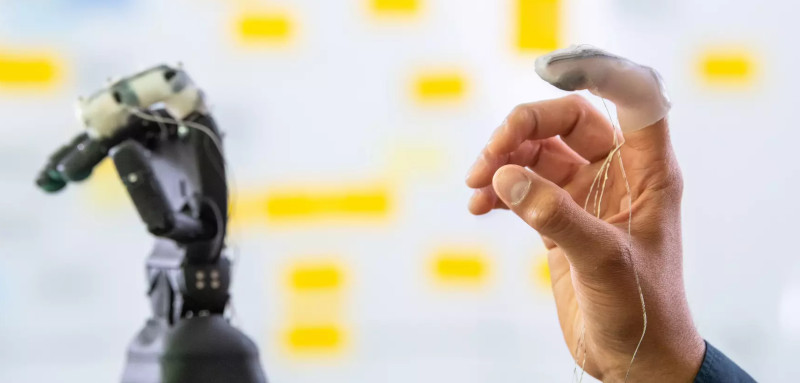
Researchers develop flexible, skin-like sensor material for robot feedback
By DE Staff
Automation Materials Machine Building RoboticsGerman research team says soft measurement cells conform to any object while providing precise, real-time data.

This soft sensor skin, developed by researchers at Technical University of Munich (TUM), is highly flexible and can be conforms to many surfaces, including robotic fingers.
(Photo credit: Andreas Heddergott / TUM)
A long standing goal in the robotics and prosthetics fields has been to recreate the sensorimotoric dexterity of the human hand. While force and torque sensors provide feedback for robotic systems currently, traditional sensors are hindered by limited customization and can’t typically be attached to arbitrary objects.
Researchers from the Munich Institute of Robotics and Machine Intelligence (MIRMI) at the Technical University of Munich (TUM), however, announced the development of an automated process to create flexible universal measurement cells.
According to the research team, their soft, skin-like sensor material can be wrapped around almost any kind of object, expanding the potential of robotics and prosthetic devices. It’s the way the skin is made, the researchers said, that allows it to freely conform to whatever surface it covers while also providing precise, real time data.
“We use software to build the structure for the sensory systems,” said Diego Hidalgo, who developed the process with fellow MIRMI researcher, Sonja Groß. “We then send this information to a 3D printer where our soft sensors are made.”
To create the skin, a 3D printer injects a conductive ink into liquid silicone. As the silicone hardens, the ink inside remains liquid, acting as a sensor and flexible conductive traces within the material. When the sensors are squeezed or stretched, their electrical resistance changes.
“That tells us how much compression or stretching force is applied to a surface,” explained Hidalgo. “We use this principle to gain a general understanding of interactions with objects and, specifically, to learn how to control an artificial hand interacting with these objects.”
The MIRMI team presented their research at the 2023 ICRA robotics conference in London.
www.mirmi.tum.de
